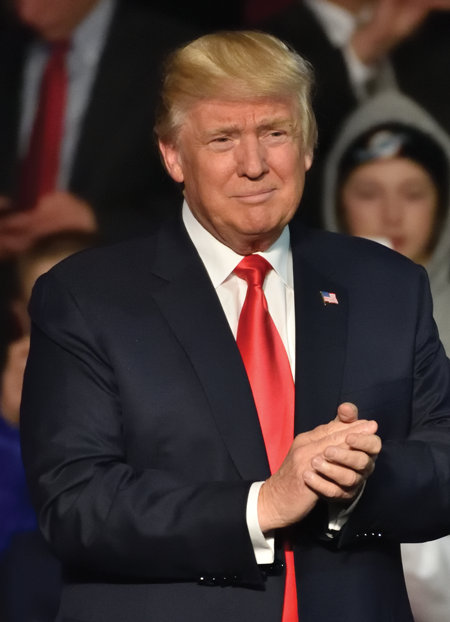Taking on Trump: ABA House urges Trump to withdraw travel ban

President Donald Trump. Shutterstock.
The ABA House of Delegates urged President Donald Trump to withdraw his executive order issued Jan. 27, titled “Protecting the Nation from Foreign Terrorist Entry into the United States.” The House also pressed him to ensure full, prompt and uniform compliance with court orders concerning the order for as long as it remains in effect.
Further, Resolution 10C (PDF)—passed during the ABA Midyear Meeting in Miami in February—urges that the executive branch ensure that any executive orders on border security, immigration enforcement and terrorism be within the bounds of laws, treaties and other agreements, and facilitate a just system for adjudicating various requests for entry into the country, as well as guaranteeing protections for refugees.
A companion measure—Resolution 10B (PDF)—also passed, reaffirming the ABA’s support for laws, policies and practices to allow access to legal protections for refugees, asylum seekers, torture victims and others similarly deserving of humanitarian refuge. It urges Congress to make new laws and provide adequate funding for refugee applications, and legislatively create timely, individualized assessment of their cases without banning otherwise eligible individuals on the basis of national origin or religion.
The resolutions were filed after lawyers from around the country spent hundreds of pro bono hours working on them. The measures passed by resounding voice vote.
A united front
ABA President Linda A. Klein spoke to the association’s policymaking body about the Trump administration, immigration and the judiciary, exhorting all lawyers to join in efforts to uphold the rule of law.
“We are very proud of lawyers around the nation who flocked to airports where immigrants were detained,” she said. “It is important that lawyers represent their clients’ interests—even unpopular interests—without fear of retaliation or persecution.”
No one sought privilege to speak in opposition to the resolutions. Among those who spoke favorably, a recurring theme existed in more than one statement: The world is watching.
The executive order and other related actions grabbed the world’s attention, said Glenn P. Hendrix, an Atlanta lawyer and House delegate from the ABA Section of International Law, a co-sponsor of the resolution. He said it raised the questions: “What does this country really stand for? What principles do we stand for?”
While the executive order didn’t specify Muslims in the ban on entry into the United States, the “lead-up” to the order “indicates that it is aimed at Muslims,” Hendrix said.
Kevin Curtin, a Boston lawyer representing the ABA Criminal Justice Section, reiterated that the “entire world is watching” and noted that “this is something we can rejoice in and love the fact that we live in a country like this, where we can speak out; a country of liberty where we’re not going to be intimidated and where we’re not going to be bullied into silence.”
The resolution concerning the executive order was co-sponsored by the New York City Bar Association; the ABA sections of International Law, Criminal Justice, and Civil Rights and Social Justice; the ABA’s Center for Human Rights, Commission on Immigration, and Standing Committee on International Trade in Legal Services; and the Massachusetts Bar Association.
The companion resolution urging legislation and policies and practices to ensure justice and safety for refugees and others in distress was co-sponsored by the Connecticut and New York State bar associations; the ABA’s International Law, and Civil Rights and Social Justice sections; and the ABA Center for Human Rights.
In other action, the House:
- Adopted Resolution 102, a policy urging state courts to develop and implement improvements in the delivery of civil justice. The policy relies on guidance from the recommendations of the report Call to Action: Achieving Civil Justice for All (PDF), endorsed by the Conference of Chief Justices. The resolution urges bar associations to promote those recommendations. The Conference of Chief Justices asked the Institute for the Advancement of the American Legal System and the National Center for State Courts to help name the 23-member committee that prepared the report.
- Adopted Resolution 112C (PDF) urging law enforcement at the federal, state and local levels to develop translations of Miranda warnings in as many languages as necessary to accurately inform criminal suspects of their right to remain silent during a custodial interrogation.
- Adopted Resolution 106 (PDF), which imposes a new Model Rule for Minimum Continuing Legal Education to replace the older model rule first adopted in 1988. The new rule recommends that lawyers be permitted to select CLE programs and their method of delivery—whether at moderated in-person programs, live programs attended via satellite, telephone or internet, or recorded versions of such programs.
It also recommends that jurisdictions require three specific credits: one credit annually in ethics and professionalism; one in diversity and inclusion every three years (a requirement the House of Delegates adopted last year); and a one-credit course on mental health and substance-use disorders every three years.
And it recommends that when lawyers are admitted to practice in more than one jurisdiction, they can claim an exemption from CLE requirements if they’ve satisfied those needed for the place where their principal practice is based.
This article originally appeared in the April 2017 issue of the ABA Journal with this headline: "Taking on Trump: ABA House urges president to withdraw travel ban."



